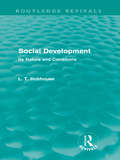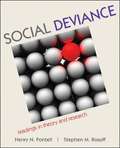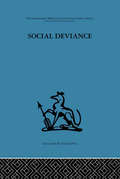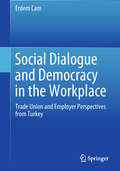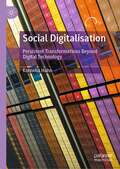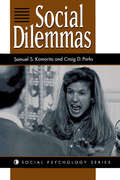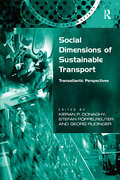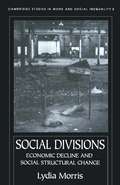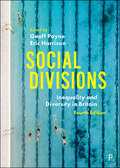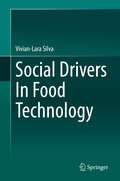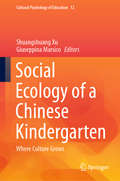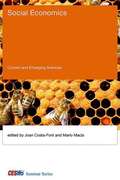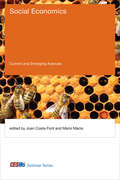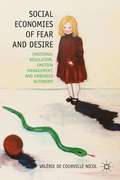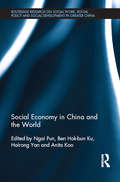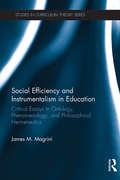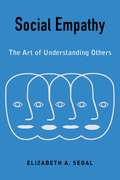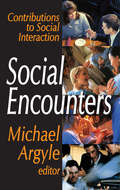- Table View
- List View
Social Development: Its Nature and Conditions (Routledge Revivals)
by L. T. HobhouseOriginally published in 1924, Professor Hobhouse's theories and commentaries upon social development are an important milestone in the history of sociological thought. Of particular interest to the modern sociologist is his delineation of the struggle of the human mind towards rationality in thought and action and his insistence on the principle that in all social investigations it is necessary to distinguish between questions of fact and questions of value.
Social Deviance (Short Introductions)
by Stuart HenryThe new edition of this popular introduction explores the meaning of social deviance in contemporary society. It traces the path by which we create deviance: how we single out behavior, ideas, and appearances that differ from the “norm,” label them as either offensive or acceptable, and then condemn or celebrate them. The book explains what kinds of behavior are banned and who bans them, exposing the important political influences underlying these processes. Refreshed with a new engaging, accessible style, the second edition features expanded treatment of the theories of deviance, new material on positive deviance, and updated references and contemporary examples throughout. At its core, Social Deviance looks at who becomes deviant and why. It delves into the multiple motives that cause rule-breakers to behave badly in the eyes of those they offend or creatively in the eyes of those they please, and it reveals the way deviants think about their actions, their moral identity, and their fellow moral outcasts.
Social Deviance: Readings In Theory And Research
by Stephen M. Rosoff Henry N. PontellIn its first edition with McGraw-Hill, this comprehensive source of classic and contemporary readings will help students learn who becomes deviant, why people become deviant, and how individual and institutional reactions help define the social reality of deviants (the persons) and deviance (the behavior). The selected readings provide experiences for students by providing a solid foundation in the field and a means by which to examine contemporary issues.
Social Deviance: Social policy, action and research
by Leslie T WilkinsTavistock Press was established as a co-operative venture between the Tavistock Institute and Routledge & Kegan Paul (RKP) in the 1950s to produce a series of major contributions across the social sciences. This volume is part of a 2001 reissue of a selection of those important works which have since gone out of print, or are difficult to locate. Published by Routledge, 112 volumes in total are being brought together under the name The International Behavioural and Social Sciences Library: Classics from the Tavistock Press. Reproduced here in facsimile, this volume was originally published in 1964 and is available individually. The collection is also available in a number of themed mini-sets of between 5 and 13 volumes, or as a complete collection.
Social Dialogue and Democracy in the Workplace: Trade Union and Employer Perspectives from Turkey
by Erdem CamThis book focuses on the experience of social dialogue in Turkey, which is a European Union candidate country. It argues that social dialogue constitutes one of the fundamental pillars of European social model and therefore should be analysed not only at the supranational level but also at the national, sectoral and workplace levels. The book critically examines social dialogue processes and mechanisms in Turkey at various levels, with focus on the workplace because it is shaped by socio-cultural elements which contain many variables. The book also identifies the shortcomings and structural impediments of social dialogue, and provides an empirically grounded theoretical explanation of social dialogue in Turkey. In the process, the book explains and clarifies key concepts to help readers grasp important points relevant to social dialogue, and contains interviews with social partners to take into consideration their views and recommendations on social dialogue. These in-depth interviews also provide a rare insight into the dynamics of social dialogue on the ground. By looking at social dialogue at various levels, the book offers a balanced view of its strengths and weaknesses in Turkey. This book is a valuable tool for students, academics and researchers interested in understanding the complex dynamics of social dialogue and workplace relations in Turkey.
Social Digitalisation: Persistent Transformations Beyond Digital Technology
by Kornelia HahnThis book shows how many previously contingent social processes have gradually been re-organised and transformed into entangled processes of ‘discontinuance’ and ‘continuance’ through the implementation of digital logic. Together with the necessary co-evolution of our collective digital literacy, this persistent process of transformation throughout modernity is theorised here as one of ‘social digitalisation.’ Social digitalisation highlights the ways in which material digital technology, like preceding material technologies, has been fitted into the longer term trajectory of digital transformation. This new social theory thus reverses prevailing accounts of the ‘digital revolution’ that focus exclusively on changes allegedly caused by material digital technology in recent decades. The book also demonstrates the fruitfulness of applying the theory of social digitalisation as a holistic approach in researching the wide-ranging consequences of contemporary digitalisation, including its contrasting effects on different social groups. It will be useful to students and researchers of sociology, communications, media and history, but also for general readers interested in understanding the overall complexity of digitalisation and how digital transformation has come to dominate the ways we live today.
Social Dilemmas: Understanding Human Cooperation (Social Psychology Ser.)
by Samuel S KomoritaEmphasizing real-world examples, Komorita and Parks illustrate both the theoretical and the ecological relevance of social dilemmas, focusing on "exchange theory" to explain how conflicts are resolved. This book is appropriate for students of psychology, political science, and sociology.
Social Dimensions of Sustainable Transport: Transatlantic Perspectives (Transport and Society)
by Stefan PoppelreuterBased on the work of the STELLA (Sustainable Transport in Europe and Links and Liaisons with America) Focus Group 3, this volume brings together leading transport academics to discuss society behaviour and public/private transport. Theoretical and empirical research from across North America and Europe form the basis of this book, which is composed of twelve chapters that fall into four logical sections. Chapters in the first section provide a contextual overview and survey trends in mobility behaviour and prospects of sustainable transport in the two continents. Chapters in the second section provide comparative assessments of difficulties posed by contemporary transport systems for three particular user groups (low-income, female, and elderly), interventions indicated, and research needed. The third set of chapters survey recent developments in behavioural modelling that lend themselves to the study of the constellation of issues concerning STELLA Focus Group 3. The remaining chapters of the book address critical issues of equity and policy implementation.
Social Divisions (Cambridge Studies In Work And Social Inequality #Vol. 2)
by Lydia MorrisFirst published in 1995. Routledge is an imprint of Taylor & Francis, an informa company.
Social Divisions 4 edition: Inequality and Diversity in Britain
by Geoff Payne and Eric HarrisonRevised, restructured and updated to reflect the latest data and debates, this new edition of the widely used, classic textbook offers students an accessible account of the major social divisions that structure social life. Written by internationally known sociologists and experts, the book: • addresses a wide range of social divisions and inequalities in novel ways, with added chapters on education and age; • provides a framework for understanding contemporary social inequalities and diversities, and how they interrelate; • lends itself to teaching in a range of contexts with the potential to dip into particular chapters for different modules, or to use the book in a more extensive way for one particular module; • features signposting through the material, as well as key points, discussion questions and selected further readings for each chapter. This clearly written volume presents a structured and critical guide to a core field that cuts across disciplines. It is an invaluable introduction and source book for students taking social inequalities and diversity modules in sociology, social policy, social work, education and health studies.
Social Dominance
by Jim Sidanius Felicia PrattoThis volume focuses on two questions: why do people from one social group oppress and discriminate against people from other groups? and why is this oppression so mind numbingly difficult to eliminate? The answers to these questions are framed using the conceptual framework of social dominance theory. Social dominance theory argues that the major forms of intergroup conflict, such as racism, classism and patriarchy, are all basically derived from the basic human predisposition to form and maintain hierarchical and group-based systems of social organization. In essence, social dominance theory presumes that, beneath major and sometimes profound difference between different human societies, there is also a basic grammar of social power shared by all societies in common. We use social dominance theory in an attempt to identify the elements of this grammar and to understand how these elements interact and reinforce each other to produce and maintain group-based social hierarchy.
Social Dreaming, Associative Thinking and Intensities of Affect (Studies in the Psychosocial)
by Julian ManleyThis book describes a way of sharing dreams in a group, called ‘social dreaming’. It explores how the sharing of real, night time dreams, in a group, can offer information on and insight into ourselves and the worlds we live in and share. It investigates how we can turn dream images, and ideas and feelings that arise from these images, into conscious thought, before describing the ways in which these can be used. Using a background of the psychosocial combined with a philosophical lens influenced by the work of Gilles Deleuze, Julian Manley shows how social dreaming can be understood as a Deleuzian ‘rhizome of affects’, a web or a root design where things interconnect in a random and spontaneous fashion rather than in a sequential or linear way. He illustrates how social dreaming can link dreams together into a collage of images, and compares this to the rhizome, where clusters of emotional intensity – which emerge from the dream images – weave and interconnect with other clusters, forming a web of interlinked dream images and emotions. From the basis of this rhizome emerges an interpretation of social dreaming as a ‘body without organs’ and the social dreaming matrix as a ‘smooth space’ where meanings emerge from the way these images form connections, and come and go according to our emotions at any particular moment.
Social Drivers In Food Technology
by Vivian-Lara SilvaThis unique and timely text is designed to help food science students learn to perform critical analysis of food processing technology and consider the incorporation of elements that touch on contemporary technological developments in the food sector. As the food industry adjusts to new consumer demands for safe and low processed foods, the time has come to harmonize product and process engineering with ‘relationship engineering’ from farm to fork. This increasingly allows the opportunity for food sector professionals to consider the existence of new drivers of food consumption. These newly discovered drivers are explored in great detail over the course of this book from industrial, economic and human resource viewpoints. Social Drivers In Food Technology presents a series of helpful case studies are presented covering six important food sectors: chocolate, coffee, yogurt, juice, baby food and snacks. These cases have been chosen in order to illustrate dynamic and innovative advances in food processing technology. The information provided over the course of this book has been gained through the thorough study of both scientific literature and organizational reports from food processing companies. The major economic aspects related to food technology are also outlined throughout the text. This multidisciplinary approach is motivated by the opportunity to contextualize the technological debate in strategy and organizational economics, contributing to the formation of human resources. This text is informed by the concept that one must look beyond the technology of the food processing sector and discuss opportunities that involve re-thinking product innovation and process, knowledge generation and human resource training. These innovations have been highlighted in food science & technology literature, but their economic and managerial implications have remained unexplored until now. With its informative case studies, helpful illustrations and quizzes and comprehensive, well-organized scope, Social Drivers In Food Technology is a much-needed textbook that will allow students to look at food processing technology from both industrial and economic perspectives and to consider the important human resource elements involved.
Social Dynamics in Swiss Society: Empirical Studies Based on the Swiss Household Panel (Life Course Research and Social Policies #9)
by Robin Tillmann Marieke Voorpostel Peter FaragoUsing longitudinal data from the Swiss Household Panel to zoom in on continuity and change in the life course, this open access book describes how the lives of the Swiss population have changed in terms of health, family circumstances, work, political participation, and migration over the last sixteen years. What are the different trajectories in terms of mobility, health, wealth, and family constellations? What are the drivers behind all these changes over time and in the life course? And what are the implications for inequality in society and for social policy? The Swiss Household Panel is a unique ongoing longitudinal survey that has followed a large sample of Swiss households since 1999. The data provide the rare opportunity to go beyond a snapshot of contemporary Swiss society and give insight into the processes in people’s lives and in society that lie behind recent developments.
Social Ecology of a Chinese Kindergarten: Where culture grows (Cultural Psychology of Education #12)
by Giuseppina Marsico Shuangshuang XuThis book is the outcome of a joint collaboration between East China Normal University and the University of Luxembourg, initiated by the Center of Ideas for the Basic Education of the Future (IBEF), and focuses on kindergartens in China from a cultural psychology perspective. By coupling young scholars from diverse cultural backgrounds as research tandems, this book uses an innovative methodological method to reveal a deeply immersing research perspective of the often complicated issues in the Chinese social reality, where long historical tradition and strong motivation for a “modernized” future are fused together and continuously evolve itself into a vibrant and intricate landscape. Meanings and values consciously or unconsciously promoted and conducted in the kindergarten are semiotic devices and they mediate children’s and educator’s daily behaviours and activities, which are constantly navigating among different social institutions and crossing the border of kindergarten. The book discusses the process of children’s socialization in the kindergarten from different angles such as cultural objects, moral education, conflict negotiation, children's drawing analysis and the role of Lego in numeracy development. It also provides an overview of basic educational needs in Chinese kindergartens as well as three commentaries to provide background information and to add a reflective angle for the readers. By reading the book, readers will hopefully go through a constantly transforming process between familiarizing and de-familiarizing along with the research tandem and develop their own understanding of the complex landscape of the Chinese kindergarten and its children as developing subjects constantly living and transcending the context.
Social Economics: Current and Emerging Avenues
by Joan Costa-Font Mario MacisThe growing field of social economics explores how individual behavior is affected by group-level influences, extending the approach of mainstream economics to include broader social motivations and incentives. This book offers a rich and rigorous selection of current work in the field, focusing on some of the most active research areas. Topics covered include culture, gender, ethics, and philanthropic behavior.Social economics grows out of dissatisfaction with a purely individualistic model of human behavior. This book shows how mainstream economics is expanding its domain beyond market and price mechanisms to recognize a role for cultural and social factors. Some chapters, in the tradition of Gary Becker, attempt to extend the economics paradigm to explain other social phenomena; others, following George Akerlof's approach, incorporate sociological and psychological assumptions to explain economic behavior. Loosely organized by theme -- Social Preferences; Culture, Values, and Norms; and Networks and Social Interactions" -- the chapters address a range of subjects, including gender differences in political decisions, "moral repugnance" as a constraint on markets, charitable giving by the super-rich, value diversity within a country, and the influence of children on their parents' social networks.ContributorsMireia Borrell-Porta, Sjoerd Beugelsdijk, Joan Costa-Font, Elwyn Davies, Julio Jorge Elias, Marcel Fafchamps, Luigi Guiso, Odelia Heizler, Ayal Kimhi, Mariko J. Klasing, Martin Ljunge, Mario Macis, Mark Ottoni-Wilhelm, Abigail Payne, Kelly Ragan, Jana Sadeh, Azusa Sato, Kimberley Scharf, Sarah Smith, Mirco Tonin, Michael Vlassopoulos, Evguenia Winschel, Philipp Zahn
Social Economics: Current and Emerging Avenues (CESifo Seminar Series)
by Joan Costa-Font Mario MacisA rich collection of current research in the growing field of social economics, covering such issues as culture, gender, ethics, and philanthropic behavior.The growing field of social economics explores how individual behavior is affected by group-level influences, extending the approach of mainstream economics to include broader social motivations and incentives. This book offers a rich and rigorous selection of current work in the field, focusing on some of the most active research areas. Topics covered include culture, gender, ethics, and philanthropic behavior.Social economics grows out of dissatisfaction with a purely individualistic model of human behavior. This book shows how mainstream economics is expanding its domain beyond market and price mechanisms to recognize a role for cultural and social factors. Some chapters, in the tradition of Gary Becker, attempt to extend the economics paradigm to explain other social phenomena; others, following George Akerlof's approach, incorporate sociological and psychological assumptions to explain economic behavior. Loosely organized by theme—Social Preferences; Culture, Values, and Norms; and Networks and Social Interactions”—the chapters address a range of subjects, including gender differences in political decisions, “moral repugnance” as a constraint on markets, charitable giving by the super-rich, value diversity within a country, and the influence of children on their parents' social networks.ContributorsMireia Borrell-Porta, Sjoerd Beugelsdijk, Joan Costa-Font, Elwyn Davies, Julio Jorge Elias, Marcel Fafchamps, Luigi Guiso, Odelia Heizler, Ayal Kimhi, Mariko J. Klasing, Martin Ljunge, Mario Macis, Mark Ottoni-Wilhelm, Abigail Payne, Kelly Ragan, Jana Sadeh, Azusa Sato, Kimberley Scharf, Sarah Smith, Mirco Tonin, Michael Vlassopoulos, Evguenia Winschel, Philipp Zahn
Social Economics: Market Behavior in a Social Environment (Belknap Ser.)
by Gary S. Becker Kevin M. MurphyEconomists assume that people make choices based on their preferences and their budget constraints. The preferences and values of others play no role in the standard economic model. This feature has been sharply criticized by other social scientists, who believe that the choices people make are also conditioned by social and cultural forces. Economists, meanwhile, are not satisfied with standard sociological and anthropological concepts and explanations because they are not embedded in a testable, analytic framework. In this book, Gary Becker and Kevin Murphy provide such a framework by including the social environment along with standard goods and services in their utility functions. These extended utility functions provide a way of analyzing how changes in the social environment affect people's choices and behaviors. More important, they also provide a way of analyzing how the social environment itself is determined by the interactions of individuals. Using this approach, the authors are able to explain many puzzling phenomena, including patterns of drug use, how love affects marriage patterns, neighborhood segregation, the prices of fine art and other collectibles, the social side of trademarks, the rise and fall of fads and fashions, and the distribution of income and status.
Social Economies of Fear and Desire: Emotional Regulation, Emotion Management, and Embodied Autonomy
by Valérie de Courville NicolAll behaviours, indeed all forms of agency, are viewed as emotionally-driven. This book provides an approach to emotional experience and agency which drastically nuances the commonly held view that fear has predominantly irrational, morally, or ideologically suspect effects which thwart the exercise of autonomy.
Social Economy in China and the World (Routledge Research on Social Work, Social Policy and Social Development in Greater China)
by Ngai Pun Ben Hok-bun Ku Hairong Yan Anita KooThirty-years of economic transformation has turned China into one of the major players in the global capitalist economy. However, its economic growth has generated rising problems in inequality, alienation, and sustainability with the agrarian crises of the 1990s giving rise to real social outcry to the extent that they became the object of central government policy reformulations. Contributing to a paradigm-shift in the theory and practices of economic development, this book examines the concept of social economy in China and around the world. It offers to rethink space, economy and community in a trans-border context which moves us beyond both planned and market economies. The chapters address theoretical issues, critical reflections and case studies on the practice of social economy in the context of globalization and its attempt to create an alternative modernity. Through this, the book builds a platform for further cross-disciplinary and cross-boundary dialogue on the future of social economy in China and the world. With examples from Asia, North America, Latin America and Europe this book will not only appeal to students and scholars of Chinese and Asian social policy and development, but also those of social economy from an international perspective.
Social Efficiency and Instrumentalism in Education: Critical Essays in Ontology, Phenomenology, and Philosophical Hermeneutics (Studies in Curriculum Theory Series)
by James M. MagriniDistinct among contemporary philosophical studies focused on education, this book engages the history of phenomenological thought as it moves from philosophy proper (the European phenomenological-hermeneutic tradition) through curriculum studies. It thus presents the "best of both worlds" for the reader; there is a "play" or movement from philosophy proper to educational philosophy and then back again in order to locate and explicate what is intimated, suggested, and in some cases, left "unsaid" by educational philosophers. This amounts to a work on education-philosophy that elucidates, through various permutations within the unique foci of each essay, the general phenomenological theme of the fundamental ontology of the human being as primordial learner. Reflecting his experience as scholar, teacher, and perennial learner, the author suggests how research in phenomenology might prove beneficial to the enhancement of both the theoretical and practical aspects of education; readers are invited to envision education as far more than merely a means by which to organize an effective learning experience in which knowledge is assimilated and skill sets are efficiently imparted, but rather as a holistic and integrated process in which knowing, acting, and valuing are original ways of Being-in-the-world.
Social Empathy: The Art of Understanding Others
by Elizabeth SegalOur ability to understand others and help others understand us is essential to our individual and collective well-being. Yet there are many barriers that keep us from walking in the shoes of others: fear, skepticism, and power structures that separate us from those outside our narrow groups. To progress in a multicultural world and ensure our common good, we need to overcome these obstacles. Our best hope can be found in the skill of empathy.In Social Empathy, Elizabeth A. Segal explains how we can develop our ability to understand one another and have compassion toward different social groups. When we are socially empathic, we not only imagine what it is like to be another person, but we consider their social, economic, and political circumstances and what shaped them. Segal explains the evolutionary and learned components of interpersonal and social empathy, including neurobiological factors and the role of social structures. Ultimately, empathy is not only a part of interpersonal relations: it is fundamental to interactions between different social groups and can be a way to bridge diverse people and communities. A clear and useful explanation of an often misunderstood concept, Social Empathy brings together sociology, psychology, social work, and cognitive neuroscience to illustrate how to become better advocates for justice.
Social Encounters: Contributions to Social Interaction
by Michael ArgyleSocial Encounters is an approach to social psychology that is not what one might expect to find in textbooks on this subject. As a companion to Social Interaction advocated by Michael Argyle and his associates, it has been used by a rapidly growing number of researchers in social psychology, and related aspects of ethology, anthropology, and linguistics. The two key ideas are to study the detailed processes of social interaction at the level of the elements of interaction, and to relate social behavior to its biological basis and cultural setting.This work collects excellent representative studies of different aspects of social interaction; as such they are important in their own right. Within the general approach described, a range of different academic orientations are included. All selections report empirical findings, and most of them introduce conceptual notions as well. One achievement of the volume has been to establish the basic elements of which social interaction consists; current research is concerned with finding out precisely how these elements function.The contributors agree that the field consists of various signals: verbal and non-verbal, tactile, visible and audible, bodily contact, proximity, orientation, bodily posture, physical appearance, facial expression, movements of head and hands, direction of gaze, timing of speech, emotional tone of speech, speech errors, type of utterance and linguistic structure of utterance. These elements can be further analyzed and divided into categories or dimensions; each plays a distinctive role in social interaction. Social behavior is studied in natural settings or replicas of natural settings, for which there are cultural rules familiar to the subjects. This is a pioneering statement in sociobiology.
Social Engineering in Cybersecurity: Threats and Defenses
by Dr Gururaj H L Dr Janhavi V Ambika VIn today’s digitally interconnected world, the threat landscape has evolved to include not just sophisticated technical exploits but also the art of human manipulation. Social engineering attacks have emerged as a formidable and often underestimated threat to information security. The primary aim of this textbook is to provide a comprehensive and in-depth exploration of social engineering attacks. The book seeks to equip cybersecurity professionals, IT practitioners, students, and anyone concerned with information security with the knowledge and tools needed to recognize, prevent, and mitigate the risks posed by social engineering. The scope of this textbook is broad and multifaceted. It covers a wide range of social engineering attack vectors, including phishing, vishing, pretexting, baiting, tailgating, impersonation, and more. Each attack vector is dissected, with detailed explanations of how they work, real-world examples, and countermeasures. Key Features • Comprehensive Coverage: Thorough exploration of various social engineering attack vectors, including phishing, vishing, pretexting, baiting, quid pro quo, tailgating, impersonation, and more. • Psychological Insights: In-depth examination of the psychological principles and cognitive biases that underlie social engineering tactics. • Real-World Case Studies: Analysis of real-world examples and high-profile social engineering incidents to illustrate concepts and techniques.• Prevention and Mitigation: Practical guidance on how to recognize, prevent, and mitigate social engineering attacks, including security best practices. • Ethical Considerations: Discussion of ethical dilemmas and legal aspects related to social engineering that emphasizes responsible use of knowledge. This comprehensive textbook on social engineering attacks provides a deep and practical exploration of this increasingly prevalent threat in cybersecurity. It covers a wide array of attack vectors, including phishing, vishing, pretexting, and more, offering readers an in-depth understanding of how these attacks work. The book delves into the psychology behind social engineering and examines the cognitive biases and emotional triggers that make individuals susceptible. Real-world case studies illustrate concepts and techniques while practical guidance equips readers with the knowledge to recognize, prevent, and mitigate social engineering threats.
Social Enterprise in China: State-Third Sector Relations and Institutional Effectiveness (Routledge Contemporary China Series)
by Echo Lei WangWang offers an empirically based exploration into work-integration social enterprises as a means for delivering social services in China. Focusing on the political economy of social enterprise development in China, Wang examines the nature of the relationship between the state and social enterprises and the implications of such relationships for their institutional effectiveness. She adopts a bottom-up approach that investigates indigenous practices embedded within the local political context. Common ground has been established internationally that the social enterprise model provides new ways of social service delivery that could potentially change and restructure the social welfare economy. However, the development path differs across social contexts, especially in an authoritarian country like China. This study provides insights into China's efforts to develop its social welfare sector and reinvigorate customary ideas about how public services could be better offered given the country's political economy. This book will be of great interest to both scholars of China’s political economy and those with an interest in the development of the social enterprise sector looking to see how this works in a Chinese context.
